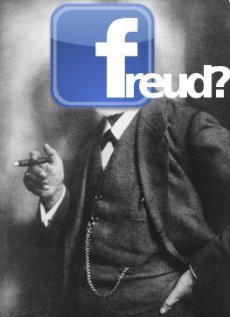Freudian Psychology
The Freudian Origins of Facebook
Freud's influence extends beyond the unconscious. It created Facebook.
Posted April 30, 2018

It is fashionable to bash Freud today because of his strange theories, especially about sex. But he has had a massive influence on scholarship and public thinking.
In a lecture by Yale psychologist Paul Bloom, he observes, “The general idea of Freud has actually been so successful both in the study of scientific psychology and in our interpretation of everyday life that, to some extent, Freud’s been a victim of his own success. We tend to underestimate the importance of Freudian thought in everyday life because he’s transformed our world view to such an extent that it’s difficult for us to remember if there’s any other way to think about it.”
The Dark, Disturbing Hallway
Freud claimed that there are aspects of the mind that operate outside of our conscious awareness.
He described the unconscious as a large hall filled with urges and mental images, all vying to enter a small room. The small room is consciousness. Standing in the doorway between the hall and the room is a watchman. The watchman looks at each impulse seeking entrance and decides whether the impulse is acceptable.
If they are unacceptable, they get turned away, remaining in the hallway of the unconscious. They get repressed.
Freud claimed that this repression of urges is the root of unhappiness and mental disorders. But he also stated that repressing our urges is necessary for civilization to function.
According to Freud, if we give into our urges, we would be happier. But society would fall apart.
Desire and Facebook
Freud influenced a French thinker named René Girard. Girard’s theory of mimetic desire holds that people do not actually know what they want, or what they value. While needs are biological, desires are social.
People are drawn to what other people want, and they want what other people have. According to Girard, mimetic desire, and the competition for the same prize, is the source of almost all the conflict in the world.
Eventually, Girard claims, conflict resulting from competition threatens social stability. People then point their rage toward a scapegoat, which brings all parties together in their hatred of a single entity.
Our desires manifest themselves by sacrificing a scapegoat. These are unconscious forces operate outside of our awareness.
Some aspects of Girard’s claims are compelling. They are borne out by work in neuroscience. One study had people rate the attractiveness of different faces. Then researchers showed them their ratings compared with how their peers rated the faces.
If their peers rated faces as less attractive or more attractive compared to their own ratings, regions of the brain related to conflict processing increased.
Later, researchers offered them the chance to rate the faces again. Conflict processing activity correlated with whether participants changed their ratings to match their peers.
Additionally, after participants viewed the faces they learned had been rated more positively by their peers than themselves, the reward centers of their brains were more active when viewing those faces compared to the first time they viewed them.
We really do change what we value based on the opinion of others.
Peter Thiel, co-founder of PayPal and early investor in Facebook, has said studying Girard led him to recognize the power of social media.
In a New York Times article, Thiel said he gave Facebook its first $100,000 investment because he saw Professor Girard’s theories being validated in the concept of social media.
Freud influenced Girard, who influenced Thiel. Freud led to Facebook.
Tasks and Daydreaming
Freud’s shadow looms large. One reason is because of our brain’s default state.
There are two different modes of the brain. In each mode, different regions are active depending on what we are doing.
One mode is the task-positive network. This is the mode we are in when we are actively engaged in an task that demands our attention. Focusing on a task requires us be in this mode.
The other mode is the default network. This is the mode we are in when we are not engaged in a task that requires our attention.
When we zone out or daydream, the task positive networks switches off, and the default network switches on. We spend the majority of our time in the default network.
More interestingly, research from social neuroscience has found that the regions of the brain that are active when we are thinking about the mental states of others overlaps with the default network.
Put differently, we spend much of our time thinking about other people and their inner thoughts.
A paper discussing advances in neuroscience asserts that our capacity to infer the intentions of others “is so automatic that people are more likely to spontaneously assess others in terms of intentional states than any other level of analysis.” We don’t just look at behavior. We’re also interested in the thoughts behind the behavior.
Freud changed the way we think about the mind and society. He popularized the idea that we can gain access to our unconscious desires and pinpoint the forces that operate beyond our awareness. While many of his claims are not taken seriously, his ideas have shaped the way we view ourselves and others. And while psychology has distanced itself from him, his fingerprints remain. Even on social media.
Follow Rob on Twitter: www.twitter.com/robkhenderson




